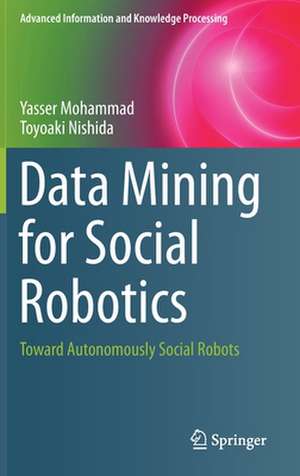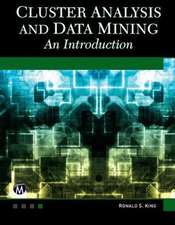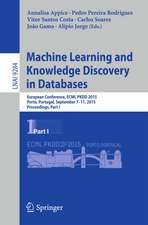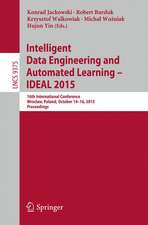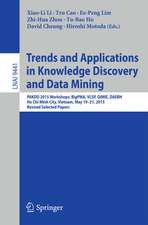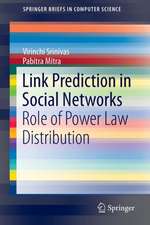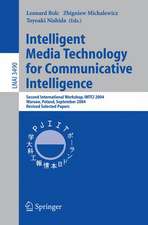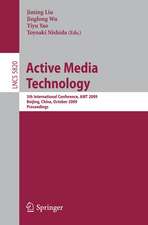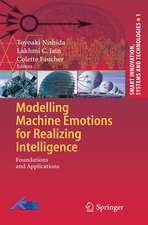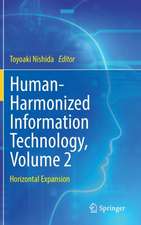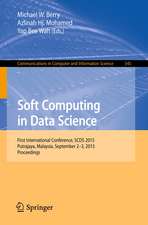Data Mining for Social Robotics: Toward Autonomously Social Robots: Advanced Information and Knowledge Processing
Autor Yasser Mohammad, Toyoaki Nishidaen Limba Engleză Hardback – 10 feb 2016
The first part provides a comprehensive and structured introduction to time-series analysis, change point discovery, motif discovery and causality analysis focusing on possible applicability to HRI problems. Detailed explanations of all the algorithms involved are provided with open-source implementations in MATLAB enabling the reader to experiment with them. Imitation and simulation are the key technologies used to attain social behavior autonomously in the proposed approach. Part two gives the reader a wide overview of research in these areas in psychology, and ethology. Based on this background, the authors discuss approaches to endow robots with the ability to autonomously learn how to be social.
Data Mining for Social Robots will be essential reading for graduate students and practitioners interested in social and developmental robotics.
| Toate formatele și edițiile | Preț | Express |
|---|---|---|
| Paperback (1) | 647.79 lei 6-8 săpt. | |
| Springer International Publishing – 30 mar 2018 | 647.79 lei 6-8 săpt. | |
| Hardback (1) | 654.05 lei 6-8 săpt. | |
| Springer International Publishing – 10 feb 2016 | 654.05 lei 6-8 săpt. |
Din seria Advanced Information and Knowledge Processing
- 20%
 Preț: 330.44 lei
Preț: 330.44 lei - 20%
 Preț: 53.43 lei
Preț: 53.43 lei - 20%
 Preț: 1042.28 lei
Preț: 1042.28 lei - 18%
 Preț: 726.85 lei
Preț: 726.85 lei - 20%
 Preț: 646.30 lei
Preț: 646.30 lei - 20%
 Preț: 990.80 lei
Preț: 990.80 lei - 20%
 Preț: 647.61 lei
Preț: 647.61 lei - 20%
 Preț: 996.56 lei
Preț: 996.56 lei - 20%
 Preț: 994.40 lei
Preț: 994.40 lei - 20%
 Preț: 985.03 lei
Preț: 985.03 lei - 20%
 Preț: 654.37 lei
Preț: 654.37 lei - 20%
 Preț: 989.79 lei
Preț: 989.79 lei - 20%
 Preț: 991.27 lei
Preț: 991.27 lei - 15%
 Preț: 645.79 lei
Preț: 645.79 lei - 20%
 Preț: 817.55 lei
Preț: 817.55 lei - 20%
 Preț: 991.46 lei
Preț: 991.46 lei - 18%
 Preț: 1114.83 lei
Preț: 1114.83 lei - 20%
 Preț: 589.93 lei
Preț: 589.93 lei - 20%
 Preț: 995.75 lei
Preț: 995.75 lei -
 Preț: 454.92 lei
Preț: 454.92 lei - 20%
 Preț: 992.62 lei
Preț: 992.62 lei - 20%
 Preț: 645.14 lei
Preț: 645.14 lei - 20%
 Preț: 647.61 lei
Preț: 647.61 lei - 20%
 Preț: 638.69 lei
Preț: 638.69 lei - 18%
 Preț: 955.08 lei
Preț: 955.08 lei - 20%
 Preț: 643.97 lei
Preț: 643.97 lei - 20%
 Preț: 983.02 lei
Preț: 983.02 lei - 20%
 Preț: 645.31 lei
Preț: 645.31 lei - 18%
 Preț: 950.96 lei
Preț: 950.96 lei - 20%
 Preț: 921.17 lei
Preț: 921.17 lei - 20%
 Preț: 653.71 lei
Preț: 653.71 lei - 20%
 Preț: 988.00 lei
Preț: 988.00 lei - 18%
 Preț: 947.67 lei
Preț: 947.67 lei - 20%
 Preț: 1004.99 lei
Preț: 1004.99 lei - 20%
 Preț: 650.92 lei
Preț: 650.92 lei - 20%
 Preț: 998.21 lei
Preț: 998.21 lei - 20%
 Preț: 642.65 lei
Preț: 642.65 lei - 20%
 Preț: 988.00 lei
Preț: 988.00 lei - 20%
 Preț: 997.38 lei
Preț: 997.38 lei - 20%
 Preț: 650.59 lei
Preț: 650.59 lei - 20%
 Preț: 647.61 lei
Preț: 647.61 lei
Preț: 654.05 lei
Preț vechi: 817.55 lei
-20% Nou
Puncte Express: 981
Preț estimativ în valută:
125.16€ • 133.83$ • 104.35£
125.16€ • 133.83$ • 104.35£
Carte tipărită la comandă
Livrare economică 18 aprilie-02 mai
Preluare comenzi: 021 569.72.76
Specificații
ISBN-13: 9783319252308
ISBN-10: 3319252305
Pagini: 328
Ilustrații: XII, 328 p. 74 illus. in color.
Dimensiuni: 155 x 235 x 21 mm
Greutate: 0.65 kg
Ediția:1st ed. 2015
Editura: Springer International Publishing
Colecția Springer
Seria Advanced Information and Knowledge Processing
Locul publicării:Cham, Switzerland
ISBN-10: 3319252305
Pagini: 328
Ilustrații: XII, 328 p. 74 illus. in color.
Dimensiuni: 155 x 235 x 21 mm
Greutate: 0.65 kg
Ediția:1st ed. 2015
Editura: Springer International Publishing
Colecția Springer
Seria Advanced Information and Knowledge Processing
Locul publicării:Cham, Switzerland
Public țintă
ResearchCuprins
Preface.- Introduction.- Part I: Time Series Mining.- Mining Time-Series Data.- Change Point Discovery.- Motif Discovery.- Causality Analysis.- Part II: Autonomously Social Robots.- Introduction to Social Robotics.- Imitation and Social Robotics.- Theoretical Foundations.- The Embodied Interactive Control Architecture.- Interacting Naturally.- Interaction Learning through Imitation.- Fluid Imitation.- Learning through Demonstration.- Conclusion.- Index.
Recenzii
“This comprehensive work focuses on human-robot interaction (HRI) using data mining and time series analysis. … In general, this book includes rich knowledge in social robot study using data mining tools. … It’s a nice book for graduate students and practitioners to dive deeper into HRI. Personally, this book led me to rethink the learning processes and interaction manners of humans, which is a rather interesting journey.” (Feng Yu, Computing Reviews, March, 2017)
Textul de pe ultima copertă
This book explores an approach to social robotics based solely on autonomous unsupervised techniques and positions it within a structured exposition of related research in psychology, neuroscience, HRI, and data mining. The authors present an autonomous and developmental approach that allows the robot to learn interactive behavior by imitating humans using algorithms from time-series analysis and machine learning.
The first part provides a comprehensive and structured introduction to time-series analysis, change point discovery, motif discovery and causality analysis focusing on possible applicability to HRI problems. Detailed explanations of all the algorithms involved are provided with open-source implementations in MATLAB enabling the reader to experiment with them. Imitation and simulation are the key technologies used to attain social behavior autonomously in the proposed approach. Part two gives the reader a wide overview of research in these areas in psychology, and ethology. Based on this background, the authors discuss approaches to endow robots with the ability to autonomously learn how to be social.
Data Mining for Social Robots will be essential reading for graduate students and practitioners interested in social and developmental robotics.
The first part provides a comprehensive and structured introduction to time-series analysis, change point discovery, motif discovery and causality analysis focusing on possible applicability to HRI problems. Detailed explanations of all the algorithms involved are provided with open-source implementations in MATLAB enabling the reader to experiment with them. Imitation and simulation are the key technologies used to attain social behavior autonomously in the proposed approach. Part two gives the reader a wide overview of research in these areas in psychology, and ethology. Based on this background, the authors discuss approaches to endow robots with the ability to autonomously learn how to be social.
Data Mining for Social Robots will be essential reading for graduate students and practitioners interested in social and developmental robotics.
Caracteristici
Reviews the key recent research in social robotics, learning from demonstration and imitation Offers a detailed explanation of key algorithms in change discovery, motif discovery and causality analysis Illustrates in detail the design methodology for developing social robots using a novel developmental architecture that employs only unsupervised learning techniques to achieve autonomous sociability Includes case studies in applying time-series analysis and data mining techniques to several problems in Human-Robot Interaction with an open-source MATLAB toolbox implementing the key algorithms Includes supplementary material: sn.pub/extras
